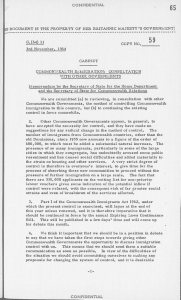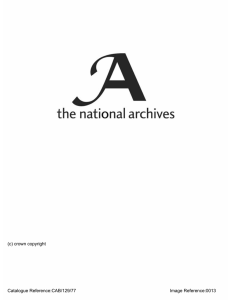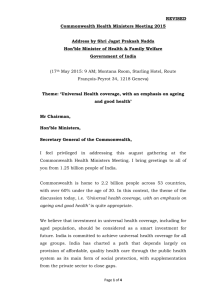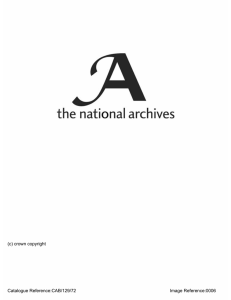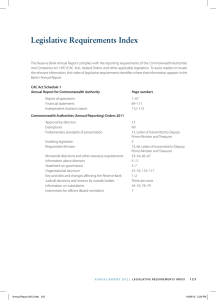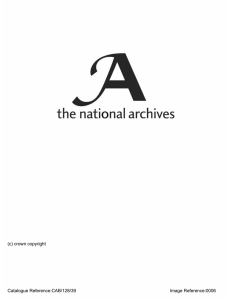(c) crown copyright Catalogue Reference:CAB/128/39 Image Reference:0058
advertisement
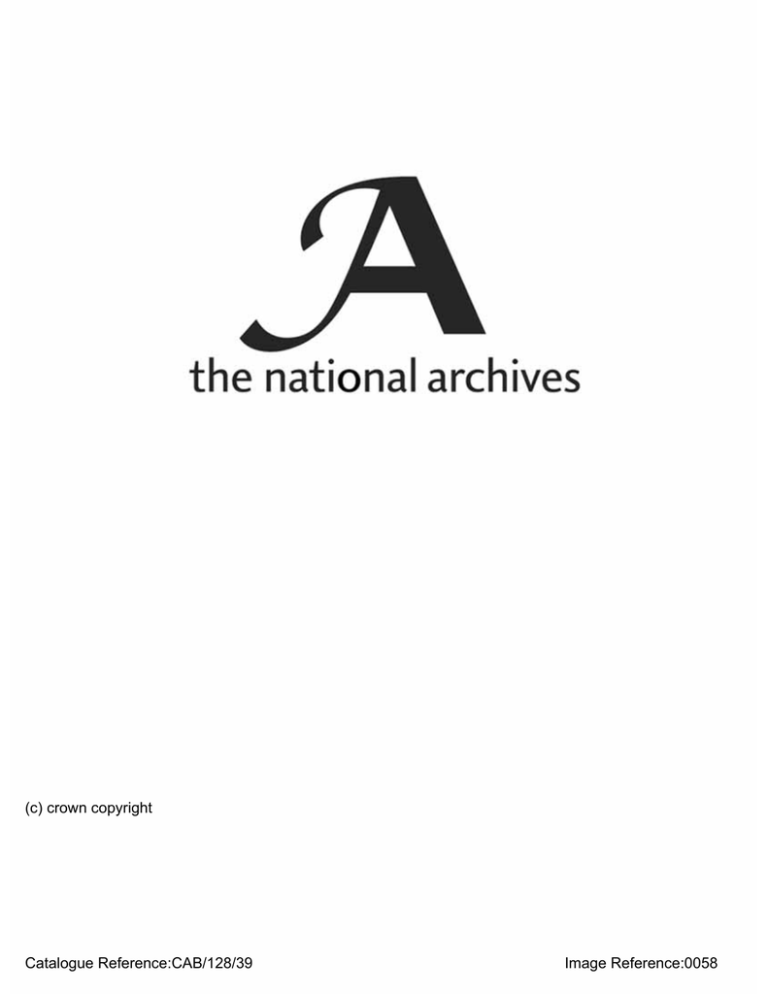
(c) crown copyright Catalogue Reference:CAB/128/39 Image Reference:0058 THIS DOCUMENT HER BRITANNIC IS THE PROPERTY MAJESTY'S O F GOVERNMENT Printed for the Cabinet. July 1965 CC (65) 42nd Conclusions Copy N o . 36 CABINET of a Meeting of the Cabinet held in the CONCLUSIONS Prime Ministers Room. House of Commons, S.W.1, on Tuesday, 27th July, 1965, at 6.30 p.m. Present: The Right Hon. HAROLD WILSON, M P . Prime Minister The Right H o n . GEORGE BROWN, M P , First Secretary of State and Secretary of State for Economic Affairs The Right Hon. MICHAEL STEWART, M p , Secretary of State for Foreign Affairs The Right Hon. Sir FRANK SOSKICE, Q c, M p, Secretary of State for the Home Department The Right Hon. WILLIAM R O S S , M P , The Right H o n . ANTHONY GREENWOOD, The Right of Hon. State for the T H E EARL OF LONGFORD, Lord Privy Seal The Right Hon. Right Hon. HERBERT BOWDEN, M p, Lord President of the Council The Right Hon. D E N I S HEALEY, M P , Secretary of State for Defence The Right H o n . ARTHUR BOTTOMLEY, M p, Secretary of State for Commonwealth Relations The Right Hon. JAMES G R I F F I T H S , M P , Secretary of State for Wales Secretary of State for Scotland M P , Secretary Colonies The The Right H o n . DOUGLAS JAY, M P, President of the Board of Trade The Right H o n . ANTHONY CROSLAND, M p, Secretary of State for Education and Science RICHARD CROSSMAN, M p , Minister of Housing and Local Government The Right Hon. FRANK C O U S I N S , M P , Minister of Technology The Right H o n . DOUGLAS HOUGHTON, M p, Chancellor Lancaster The Right of the Duchy of FRED Hon. PEART, M P, Minister of Agriculture, Fisheries and Food The Right Hon. FREDERICK L E E , M P , The Minister of Power Right H o n . T O M FRASER, M P, Minister of Transport The Right Hon. BARBARA CASTLE, M P , Minister of Overseas Development The following were also present: The Right Hon. KENNETH ROBINSON, The The Right Hon. Sir ELWYN Q c , M p, Attorney-General Right Hon. JOHN DIAMOND, M P , Chief Secretary, Treasury M p, Minister of Health JONES, Mr. MAURICE FOLEY, M P, Joint Parliamentary Under-Secretary of State, Department of Economic Affairs T h e Right Hon. E D W A R D SHORT, M P , Parliamentary Secretary, Treasury Secretariat : Sir BURKE T R E N D Mr. P. R O G E R S Mr. D . S. LASKEY Subject COMMONWEALTH IMMIGRATION Commonwealth Immigration (Previous Reference: CC (65) 35th Conclusions, Minute 3) The Cabinet considered a memorandum by the Lord President of the Council (C (65) 109) to which were annexed drafts of a White Paper and of a statement of Government policy, on Commonwealth immigration, and a memorandum by the Home Secretary (C (65) 111) on the admission of foreign workers. The Lord President said that the statement of Government policy would be made on 2nd August and it was intended that the White Paper should be published later the same day. The following main points were made in the discussion of the White Paper. Vouchers The Lord President said that the Cabinet had decided on 8th July that the total number of vouchers should be 8,500 a year. Within this total 1,000 vouchers would be available for immigrants from Malta as a temporary arrangement subject to review after two years. The Cabinet had taken the view that no publicity should be given to this arrangement and that the total figure for vouchers should not otherwise be divided into quotas for separate countries. In fact, however, the arrangement for Malta had already become known and the Commonwealth Immigration Committee therefore recommended that it should be mentioned in the White Paper. It was also recommended that, to ensure a fair distribution, no one Commonwealth country should be given more than 15 per cent of the total of Category A vouchers, and that this should also be mentioned in the White Paper. In discussion it was pointed out that the special arrangement for Malta was being made not because of a specific commitment to accept Maltese immigrants but because of our obligation to assist Malta to deal with the economic difficulties caused by changes in our defence policy. However, if this were explicitly stated in the White Paper it might set a precedent for similar claims from other territories. The White Paper should therefore refer to our special obligations to Malta without specifying how these arose. It would also be preferable that the White Paper should refer to a total of 8,500 vouchers within which there would be an allocation of 1,000 vouchers for Malta; and this allocation would be subject to review after two years. The Lord President said that in addition to the limit of 15 per cent of the vouchers for any one Commonwealth country it was recommended that in the allocation of Category A vouchers the Minister of Labour should normally deal with applications in the order of the date of their receipt but should have discretion to give a measure of priority to the more essential types of employment such as the hospital and transport services. In discussion it was pointed out that if Category A vouchers were allocated according to a system of priorities this would mean that we should be distributing all the vouchers in accordance with the needs of the United Kingdom and without regard to the interests of the Commonwealth countries, whereas the conclusion of the Cabinet on 8th July was that the Category A vouchers should be issued according to the date of the application. It should therefore be made clear in the White Paper that Category A vouchers would be available for unskilled as well as skilled workers and that the applications would generally be dealt with in the order of the date of their receipt. In administering the scheme, however, the Minister of Labour should have a measure of discretion in allocating these vouchers. Aliens The Home Secretary said that he had been invited to report to the Cabinet if it appeared that the number of aliens accepted for permanent settlement in the United Kingdom was likely to rise above 6,000 a year. On the basis of the figures during the first six months it seemed likely that the total in 1965 would be over 11,000. The real comparison, however, should not exclude dependants and, on this basis, in 1964 55,900 Commonwealth immigrants were accepted for settlement as against 19,211 aliens. Even with the reduced number of vouchers now proposed for Commonwealth immigrants it seemed likely that their total, including dependants, would be at least double that of alien immigrants for several years to come. There would also be practical difficulties about restricting the number of alien workers accepted for permanent settlement since permission for such settlement could only be sought after the alien had been resident for four years in this country. In discussion it was suggested that it would be difficult to defend a situation in which the number of alien workers settling permanently in this country was higher than that of Commonwealth workers, and that measures should therefore be taken to ensure that the number of such aliens did not rise above the present level. This was also desirable in order to prevent a possible increase in the number of alien workers to fill jobs which would be available owing to the reduced number of Commonwealth immigrants admitted under the voucher scheme. On the other hand it was pointed out that restrictions on the issue of work permits for aliens would be contrary to our traditional policy and would have a damaging effect on the employment needs in this country. Since it seemed certain in any event that for many years the total number of Commonwealth immigrants would greatly exceed the number of alien immigrants, new restrictions on the entry of aliens should not be imposed. The point should not be specifically mentioned in the White Paper, but if questions were asked it should be stated that it would be the policy of the Government that the number of non-Commonwealth immigrants admitted for permanent settlement would continue to be restricted to a figure considerably below that for Commonwealth immigrants. Dependants The Lord President said that the Commonwealth Immigration Committee proposed a scheme whereby immigrant workers, both those already in the United Kingdom and those coming in future, would declare their dependants, if they wished them to come to the United Kingdom, so that the particulars could be checked in the country of origin and entry certificates issued. The scheme would be designed to prevent evasion of the controls and although it could not be fully effective, particularly during the initial stage, it was desirable that it should be introduced as soon as possible in order to check the influx of dependants to this country which might otherwise follow the publication of the White Paper. A firm date of 1st September should therefore be given in the White Paper for the introduction of the scheme. In discussion it was pointed out that the scheme would be difficult to administer, both by the Home Office in this country and by the Commonwealth Relations Office and the Colonial Office in respect of the countries of origin. The White Paper stated that the forms which immigrants would require for the declaration of their dependants would be available early in September; it would be difficult to be more specific than this. This part of the White Paper should therefore stand as drafted. Conditions of entry The Home Secretary said that it had been agreed that power should be taken to require Commonwealth students and other immigrants whose bona fides were in doubt to register with the police, but it had been suggested that this power should not be exercisable unless expressly conferred by a statutory instrument subject to the Affirmative Resolution procedure. If control were to be effective and evasion prevented it was essential that immigration officers should be able to require registration with the police as a condition of entry, although this power would in fact be exercised very sparingly. In discussion it was agreed that the Affirmative Resolution procedure need not be followed in respect of the power to require registration with the police. Repatriation The Home Secretary said that in accordance with the Cabinet decision on 8th July he proposed to seek a general power, in addition to his power to act on the recommendation of a Court, to repatriate a Commonwealth citizen if he considered the public interest to require it. This was necessary if he were to be able to deal effectively with Commonwealth immigrants whose conduct or activities clearly pointed to repatriation but fell short of criminal activities which could be proved in a court of law and could not therefore be made the basis of a criminal charge. The powers he would seek in respect of Commonwealth immigrants would go no further than the powers he already possessed in the case of aliens. In discussion it was pointed out that the H o m e Secretary's powers in relation to aliens already aroused criticism and the extension of such powers to Commonwealth immigrants would be regarded as unjustified both in this country and in the Commonwealth. The power to repatriate Commonwealth immigrants other than on the recommendation of a Court should therefore be limited to cases in which the immigrant had evaded control, for instance by obtaining entry by misrepresentation or by disregarding the conditions on which he had been admitted. The relevant paragraphs of the White Paper should be amended in this sense. Financial assistance for local authorities The Lord President said that the Treasury had proposed a redraft of paragraph 62 of the White Paper. In discussion there was agreement that the Treasury redraft should be accepted, though the words " for a limited period " should be omitted. It seemed inevitable that the special measures envisaged would have to be continued for a number of years but the omission of these words would not prevent the arrangements being reviewed, and if necessary modified, from time to time. A number of other amendments to the White Paper and to the statement of Government policy were agreed. The Prime Minister said that, subject to the amendments agreed in discussion, the statement of Government policy would be made on 2nd August and the White Paper published on the same day. He proposed that the White Paper should be issued in his name and that, in his absence, the Lord President should make the statement on his behalf. The Cabinet— (1) Approved the drafts of the White Paper and of the statement of Government policy annexed to C (65) 109, subject to the amendments agreed in discussion. (2) Took note that the statement of Government policy would be made by the Lord President of the Council on 2nd August, and that the White Paper would be published in the Prime Minister^ name on the same day. Cabinet Office, 28th July, S.W.1, 1965.
